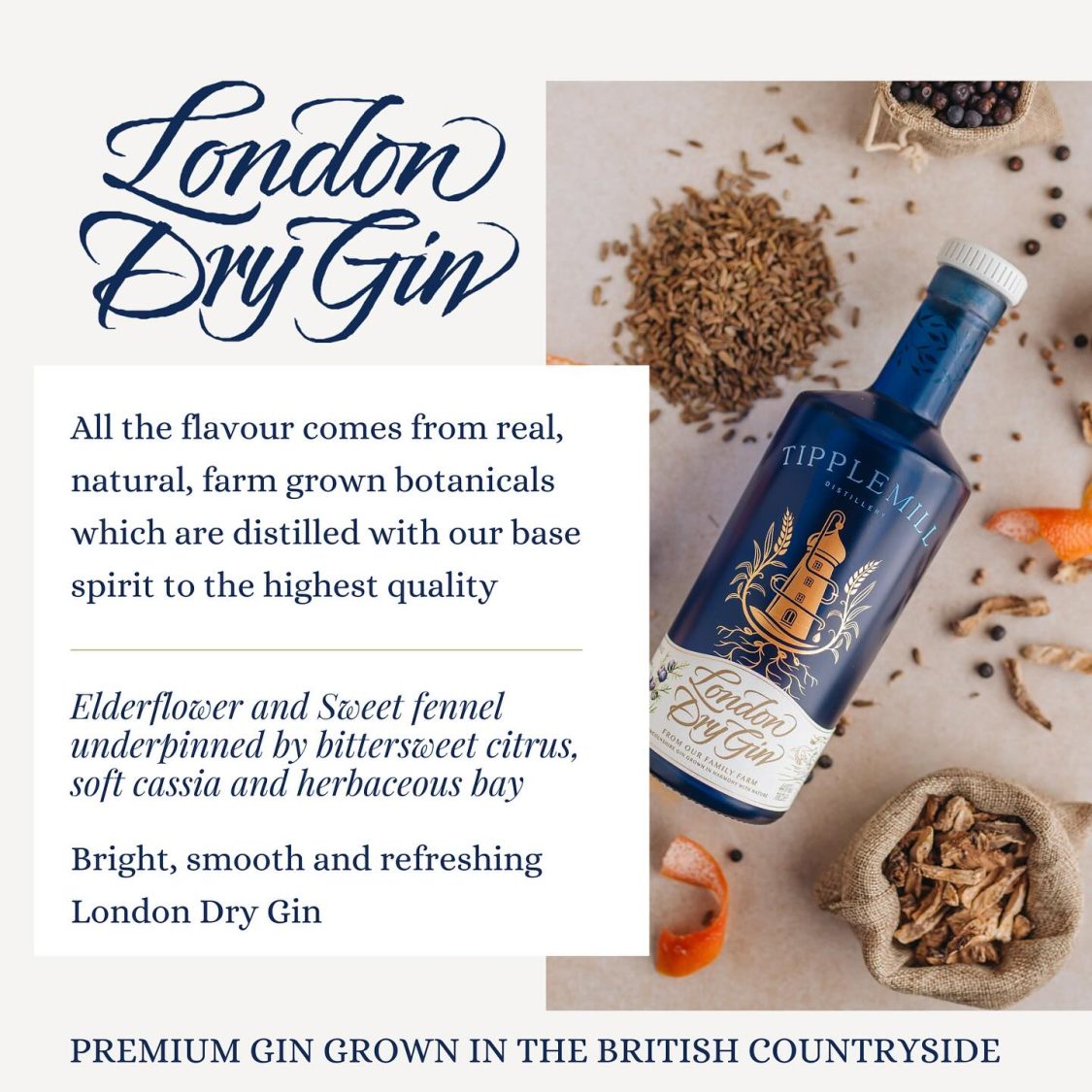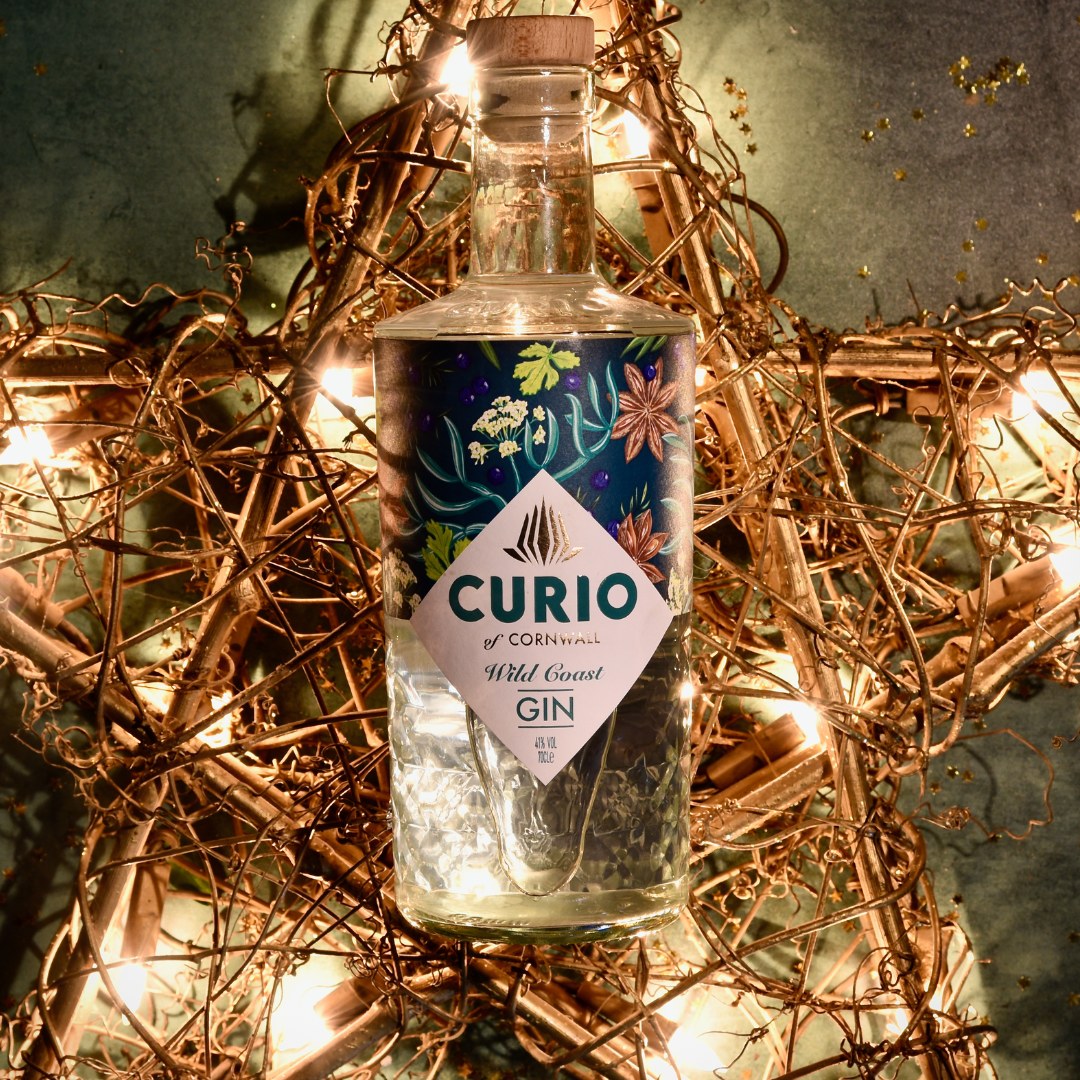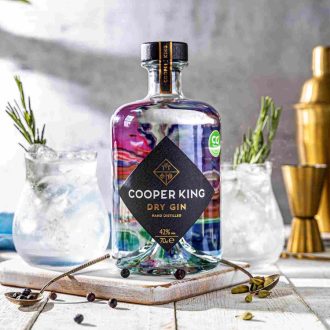
The Mill Farm, Sutterton, Boston PE20 2EL, UK

Tipplemill Quality London Dry Gin
Rooted in Lincolnshire
Where it all began…
Across the road from Mill Farm stands Tower Windmill. During the 1900s Frank Craven, our farms founder, worked as the Miller producing flour from wheat for use in baking and animal feed. A natural progression saw Frank purchase the land surrounding the mill so that his sons could grow the wheat he needed for milling. Five generations later we remain custodians of the same land which now grows the grain for Tipplemill gin.

Tipplemill Quality London Dry Gin

Tipplemill Quality London Dry Gin
Where we are now…
Inspired by our milling heritage, Tipplemill uses the ultimate renewable energy source, the wind, to grind our grain between the millstones of the tallest working windmill in the UK to produce the all-important wholemeal flour needed to make the base alcohol spirit.
Producing a premium spirit in harmony with nature represents the perfect way to add fun and innovation to farming through a crop that has been lovingly produced on our farm over the four generations and now into the fifth.


A farm is more than land and crops, it is a family’s heritage and future
Mill Farm is a family farm in South Lincolnshire
At the heart of Tipplemill’s spirit is the grain that we grow on the farm which is sown each autumn and harvested during the summer. This is the grain that is milled to produce the foundation of our base spirit.
Where fields of our wheat grow, plants and animals, weather and landscape work together to create a rich ecosystem. As fourth and fifth generation farmers, we choose to grow our gin in harmony with nature which reflects the spirit in every bottle.
Reclaiming traditions and bringing back flora and fauna to our landscape, to restore the natural balance of the land.

Tipplemill Quality London Dry Gin
“I think having land and not ruining it is the most beautiful art that anybody could ever want to own.”
Andy Warhol
British Craftsmanship
Just a 10 minute drive from the farm nestled in the fen landscape stands Moulton Windmill. The tallest working windmill in the UK! Built in 1822 this windmill has stood the test of time. Now a team of volunteers carry this traditional skill into the 21st century.
Whilst our founder Frank milled his wheat for baking, we select the plumpest grains from our wheat harvest and slowly grind them between millstones to produce a delicate wholemeal flour. This serves as the foundation on which our London Dry Gin is crafted and the inspiration behind our unique bottle stopper.

Tipplemill Quality London Dry Gin
The wheat is raised up from the ground loading floor by the wind powered chain hoist and emptied into storage bins. The sails are attached to the wind shaft which transfers the power from the wind driven sails into the drive shaft which turns the millstones and grinds the grain into flour.

Tipplemill Quality London Dry Gin
To mill our wheat, 2 stars must align.
It must be a Wednesday.
Moulton Windmill is run by a wonderful team of volunteers who come in to work between 10-12am on a Wednesday to mill.
And of course it must be windy!
Our flour is made using the ultimate renewable energy source, the wind. However, the wind must be blowing between 15-20mph to turn the millstones at the optimum speed to create the perfect consistency of flour for the foundation of our base spirit.
We can only make Tipplemill if it’s windy on a Wednesday
Award Winning Tipplemill London Dry Gin
Heartily traditional at its core, with a flavoursome cameo of bittersweet citrus and elderflower with depth and character from sweet fennel seeds and cassia. A gin with character smooth and complex perfect for a martini or as a refreshing G&T
44% ABV
70cl

Tipplemill Quality London Dry Gin
Tipplemill London Dry has won a Double Gold Medal and been crowned Best Overall Gin at the New York World Wine & Spirits Competition 2023 and a Double Gold Medal at the San Francisco Spirits competition 2024
“An outstanding well-balanced gin with notes of juniper, baking spices, and citrus on the palate; a refreshing finish”

Tipplemill Quality London Dry Gin
THE GIN GENIUS / The Sun
Novice distiller’s gin named best in the world — just a WEEK after she launched it
Her Tipplemill London Dry Gin triumphed against others from across the globe and also picked up a Double Gold Medal
- Marc Walker
- Published: 22:26, 31 Dec 2023
- Updated: 22:26, 31 Dec 2023

Brit drinks maker Lily Craven won at the prestigious New York World Wine & Spirits Competition
Her Tipplemill London Dry Gin triumphed against others from across the globe and also picked up a Double Gold Medal.
It is made using the UK’s tallest working windmill, with grain harvested by her brother James from their family farm near Boston in Lincolnshire.
Lily said: “To be rated among the best gins in the world and then, out of these, to be named best overall gin — just a week after launch — is a phenomenal achievement for all involved and makes me incredibly proud.”
The siblings are the fifth generation to work Moulton Windmill and Mill Farm.
Their great-great-grandfather Frank Craven bought the land around his mill more than a century ago so that his sons could grow wheat.
Lily added: “I set out to create the best possible London dry gin using our wheat grown on our family farm.
“Taking inspiration from our family’s milling heritage, we use the power of the wind to grind our grain between the millstones of the tallest working windmill in the UK.
“This flour is the foundation on which our base spirit is crafted.”

Tipplemill Quality London Dry Gin / Business Award 2024

Tipplemill Quality London Dry Gin / Business Award 2024
Our commitment to quality has seen us partner with the team at Ramsbury Brewery & Distillery Co. Ltd to transform our flour into our base spirit.
Like us, Ramsbury are farmers first. Agricultural heritage and respect for the land is ingrained in both our organisations. Their diversification journey led them into brewing and distilling using the wheat grown and harvested on their estate with sustainability at the heart of their production.
In Ramsbury’s state of the art distillery, heat is generated from a biomass boiler powered by the estates sustainable woodland to create power and steam. Wastewater is funnelled back to the land after being safely purified through a series of wildlife friendly reed filtration beds. Spent grain from the distillery is fed to the cattle and their manure incorporated back into their fields.


The expertise of Tibor and Paul in the complex operations of mashing, fermentation and distilling a spirit to the London Dry standard is exceptional.
The complex processes of creating a base spirit from scratch takes twelve days. Each stage of mashing, fermentation, stripping, rectification, polishing, and demethylation requires precision, constant monitoring and importantly patience.

Planting the wheat to producing our base spirit is a 12-month process. We consider the extra time, graft and cost worth it to produce the highest quality premium base spirit on which Tipplemill Gin is crafted.
No cutting corners. Authentic distilling at the highest level, using the highest quality ingredients

Tipplemill Quality London Dry Gin / Distillery

We have selected the highest quality and responsibly sourced ingredients from our farm and from around the world.
The origin of each botanical plays an important role in creating the taste of Tipplemill.
Sweet fennel
Sweet fennel is grown on our farm within a winter bird food cover and it is those seeds we use for their sweet aniseed aroma with delicate mint notes.
In autumn we collect the seeds which are dried naturally on the stalk making harvesting quick and easy. We snip the heads off and with a little shake the seeds drop out. We then sieve and sort through the seeds to remove any odd bits of chaff, stem and damaged seeds.
Any seeds blown out by the wind or knocked off by perching birds allows the fennel to reseed naturally. The sweet fennel plants also act as structural supports for the weaker stemmed seed bearing crops such as white millet and buckwheat. A favourite snack for our farmland birds.

Elderflower
Elderflowers have a uniquely fresh, floral and lychee flavour profile and are found within our hedgerows around the farm. In late May to early June these umbrellas of dense white flowers are at their finest and ready for harvest.
We snip off the crowns (leaving a supply to develop into berries – an important food source for birds and insects during late summer) and then lay the flower heads on racks to dehydrate and store ready for use.

Juniper berries – Tuscany
We have sourced the very best quality berries from the wild hills of Tuscany. Here the wild bushes benefit from large amounts of sunshine to ripen the berries and hence produce a more fruity profile than other locations.
The dark plum coloured ripe berries are hand harvested from September to November. Using a large stick the farmers hit the Juniper bushes to release the ripe berries which are caught in sheets below. They are then sorted to remove any shrub needles and any unripe berries.

Coriander seeds – Black Sea Coast
Coriander seeds are a cultivated crop grown by farmers in many locations globally and produce different flavour profiles depending on the climate.
We chose to source our coriander seeds from the Black Sea Coast as the seeds grown on this flat plain of coastline have a particularly citrus flavour profile.

Grapefruit and Orange Peel – Mediterranean
Our grapefruit and orange peels are sourced from the Mediterranean. After the main harvest of fruit for juice, the remaining fruit is picked, peeled, and then dried in long ribbons in the hot Mediterranean sun before being hand sorted into sizes.
These sun-dried peels retain very high levels of oils, perfect for use in Tipplemill London Dry Gin providing a robust citrus flavour with the perfect balance of bitter sweet notes.


Angelica root – Belgium
Angelica from cultivated crops requires the most specialist farming skills. We selected angelica root sourced direct from farmers in Flanders, Belgium. Like Tipplemill’s wheat this angelica crop is the result of generational farming expertise.
Their continued use of historical root crop and seeds produce large flavoursome roots with an aromatic earthy profile.


Orris root – Morocco
In Morocco iris roots are harvested by hand from the iris plant. It is then dried in the sun and carefully hand peeled before being left to mature and stabilise before being ground down in to powder ready for use.

Inspired by elderflower foraged from our hedgerows and sweet fennel from our botanical garden
The Still
To create Tipplemill London Dry gin we use a traditional copper pot still
96% ABV./vol spirit is reduced to around 50% ABV with water extracted from the bore hole fed from the natural chalk aquifers tipped into the still with the 10 botanicals and gently heated.
As the temperature rises, the alcohol turns into vapour carrying the wonderful botanical oils within it. The copper of the still acts as an excellent conductor of heat dispersing the heat evenly, but also reacting with the spirit and essential oils to soften the resulting distillate creating a smoother more refined gin.
The vapour then passes through a condenser where cold water turns the vapour back into its liquid form. The distilled liquid comes off in three parts. The first liquid that comes out of the still is the heads. This alcohol produced whilst the still is heating up does not have the flavour profile we want so is collected and put to one side.
Then we begin collecting the hearts. This is the precious liquid that we keep! As ever, we don’t rush the distillation. We distill with the luxury of time, letting the liquid bubble away gently allowing the oils from each botanical to vaporises at their different stages. Monitoring the distillation closely, tasting each flavour profile as it develops, we build the enjoyable journey of Tipplemill flavour as the distillation evolves.

At the point where any unwanted oils which are heavier in flavour come to taste, we select the exact moment to cut from collecting the hearts and start collecting tails. This is known as the distillers cut.
To be called a London dry gin, nothing can be added post distillation which makes Tipplemill a demonstration of genuine craftsmanship. No tweaks to disguise any missed heads or tails, this is authentic distilling to the highest level.
The final step is reducing our gin to a bottle strength by adding pure water. The minimum strength for a London dry is 37.5% alc./vol. We found that in being generous in spirit bottling at a strength of 44% alc./vol. the botanical flavour profiles are best displayed.

Distilled with the luxury of time using a copper pot still








